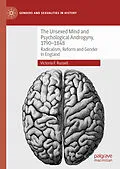This book seeks to redefine the radical debate on gender in England between the 1790s and 1840s, examining the little-studied concept of psychological androgyny or the unsexed mind. Perceived often as a literary and aesthetic motif popular in Romantic poetry, this book examines the revival and use of this egalitarian concept on the radical margins of Protestant non-conformism. Inspired by an ethos of perfectibility, a close-knit community of writers, educationalists, ministers, and scientists, called for a revolution in the human mind. German-led advances in science pointed not to essential sexed differences but to naturally occurring androgynies, encouraging renewed interest in ancient mythical and biblical tales of androgyny. New practices were introduced into private homes and classrooms. Gender-neutral curriculums and texts books, mixed-sex classrooms, the promotion of androgynous domesticity and the rejection of female vows of obedience, were just a few practices designed to undermine arbitrary and discriminatory cultures of patriarchy.
Victoria F. Russell is a Leverhulme Early Career Fellow at Keele University, UK.
Autorentext
Victoria F. Russell is a Leverhulme Early Career Fellow at Keele University, UK.
Klappentext
This book explores a significant lacuna in British history. Between the 1790s and the 1840s, the concept of psychological androgyny or the unsexed mind emerged as a notion of psychosexual equality, promoted by a small though influential network of heterodox radicals on the margins of Rational Dissent. Deeply concerned with the growing segregation of the sexes, supported seemingly by arbitrary and increasingly binary models of sexual difference, heterodox radicals insisted that while the body might be sexed, the mind was not. They argued that society and the prejudicial masculinist institutions of patriarchy should be reformed to accommodate and protect what one radical described as an 'infinitely varied humanity'. In placing the concept of psychological androgyny centre stage, this book offers a substantial revision to understandings of progressive debates on gender in the late eighteenth and early nineteenth-century in Britain.
Inhalt
Chapter 1. Psychological Androgyny - Uncovering a Radical Concept.
